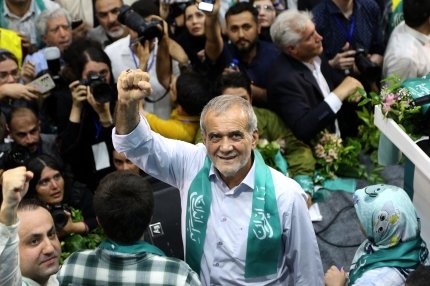Reformist politician Masoud Pezeshkian won the second round of the presidential election in Iran on July 5 against the ultra-conservative candidate Said Jalili and will become the ninth president of the Islamic Republic of Iran.
Points of attention
- Pezeshkian is known for his openness to negotiations with the West and his criticism of the policies of the Islamic Republic.
- Pezeshkian's victory could lead to a reduction in tensions in Iran's relations with other countries, as well as to social liberalization in the country.
- The new president is expected to help reduce tensions through negotiations with world powers and the restoration of the nuclear agreement.
16.3 million voters voted for Masud Pezeshkian
Former Minister of Health Pezeshkian has represented the province of West Azerbaijan, where the majority of the population is ethnic Azerbaijanis, in the Iranian parliament for the past 16 years.
Despite more than 20 years in politics, Pezeshkian did not face accusations of corruption and was not involved in political scandals.
In the first round of the presidential elections in Iran on June 28, Pezeshkian led among four candidates, receiving 42.5% of the vote, and already on July 5, he won 53.6%.
Voters in Iran have gone to the polls in a run-off election to choose a successor to late President Ebrahim Raisi, who died in a helicopter crash in May along with the foreign minister and other officials.
The two contenders were Saeed Jalili, 58, a hardliner who was a former negotiator with the West over Iran's controversial nuclear program, and Pezeshkian, 69, a heart surgeon and reformist politician who served as health minister from 2001 to 2005.
What is known about the new president of Iran
Masoud Pezeshkian was born in the Iranian city of Mahabad in the province of West Azerbaijan, where the majority of the population is Kurdish, so he speaks Kurdish and Azerbaijani languages fluently.
He trained as a doctor and Pezeshkian went to the front during the 1980-88 Iran-Iraq war to fight and serve as a medic. After his military service, he specialized in cardiac surgery.
Pezeshkian, 69, also worked in academia, heading the Tabriz University of Medical Sciences from 1994 to 1999.

Shortly after finishing work at the university, Pezeshkian entered politics, moved in 2000 to Tehran, where he received the position of Deputy Minister of Health in the government of then President Mohammad Khatami.
In 2001, Khatami appointed Pezeshkian as Minister of Health. Two years later, the parliament unsuccessfully tried to impeach Pezeshkian. Among its shortcomings, critics cited poor personnel policy and irrational use of the World Bank loan.
In 2008, three years after leaving the government, Pezeshkian ran for parliament and won first place in the electoral district in Tabriz. He was elected five times in a row for four-year terms.
Pezeshkian reads the Koran frequently and is an expert on the Nahjul Balagha, a collection of sermons and sayings attributed to the first Shia imam, Ali. The book has a special place among Shiites in Iran.
A former health minister criticized the Islamic Republic's policy of forcing the wearing of the hijab, warning in 2023 that it only encourages people to hate the religion.
He has expressed openness to talks with the West and has criticized chants directed at other countries, including the United States, in the past.
But Pezeshkian also spoke in support of the principles of the Islamic Republic and insisted on the need to adhere to the policies outlined by Supreme Leader Ayatollah Ali Khamenei, a figure who supported Vladimir Putin in his war against Ukraine.
According to political analysts, Pezeshkian's victory can promote a pragmatic foreign policy and reduce tensions through negotiations with major powers to renew the 2015 nuclear deal, as well as improve the prospects for social liberalization and political pluralism in Iran.




